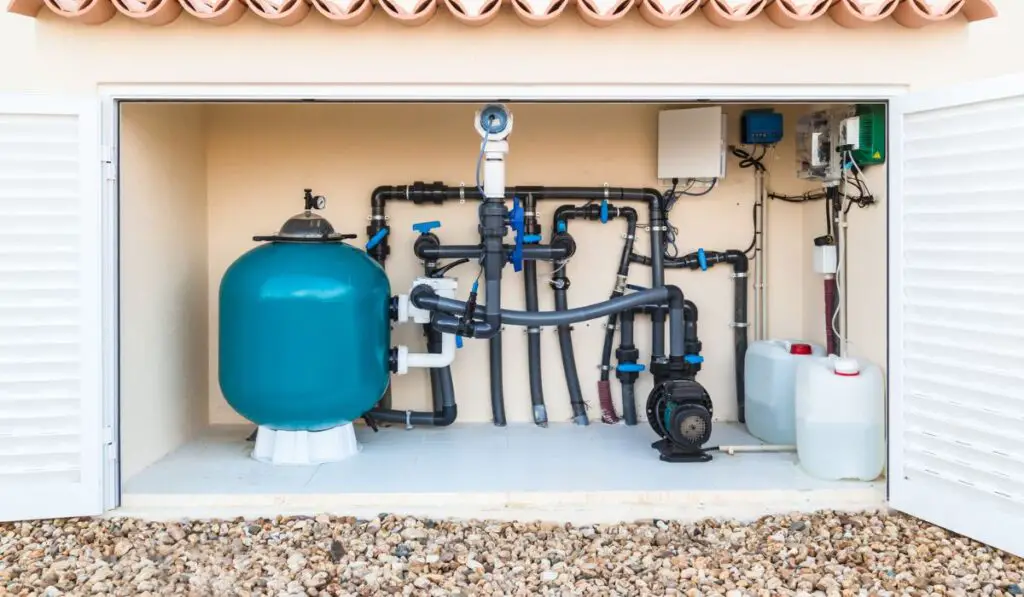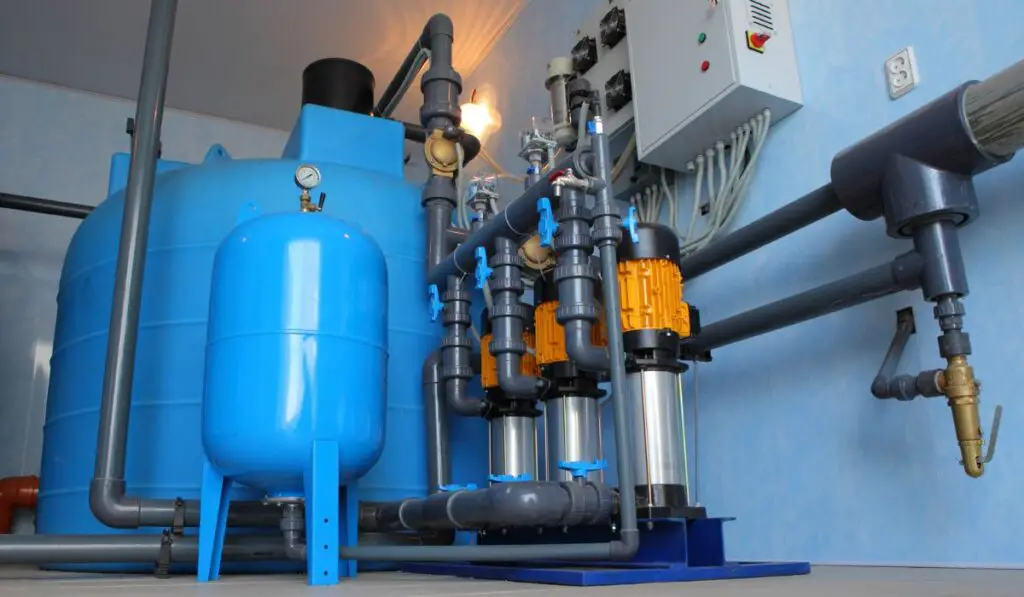If your pool pump isn’t working properly, it won’t be able to filter or circulate the water, leading to a dirty, cloudy, and germ-laden swimming pool. However, since most mechanical pool equipment is kept hidden, it can be difficult to know if you need to fix the pump motor or just replace the entire pool pump. So, how can you tell when your pump is no longer functioning?
A bad pool pump might making grinding, popping, or clicking noises, or no noise at all if the motor is dead! You can also spot a bad pool pump if the water pressure in your pool keeps dropping every few hours, if the pump keeps shutting off automatically, or if it trips the breaker often.
Replacing the entire pool pump costs twice as much as fixing
or replacing the motor. For this reason, it’s important to understand the difference between a bad pool pump and a faulty motor. Let’s look at how pool pumps work, how long they usually last, and how you can tell when they’re in need of replacement.
How Do Pool Pumps Work?

Pool pumps like this Hayward model (on Amazon) are the very heart of a swimming pool. They circulate water and ensure that all treatment chemicals are properly dispersed throughout the pool.
In a typical pool pump, an electric motor powers an impeller located inside the pump housing. The impeller draws in pool water from each drain and passes it through the filter before pushing the clean water back out through the water inlets.
Just before the water flows into the pool pump, it passes through a strainer basket that collects leaves, branches, and other large debris that may clog or damage the pump. Meanwhile, the filtration system eliminates bacteria, algae, sand, and other small debris from the pool water.
How Long Do Pool Pumps Usually Last?
High-quality, well-maintained pool pumps usually last around 8-12 years. However, if you’ve neglected several critical pool services, then your pump will likely have a much shorter life, maybe 6-8 years, or obviously much shorter if something dramatic happens from lack of routine maintenance.
The components and parts inside the filtration system and pool pump have a shelf life of around 11 to 15 years. So, if you’ve had your pump for more than a decade, it’s probably time to purchase a new one.
Along with being long-lasting, modern pumps are also more energy-efficient, helping you save money in the long run.
How Can You Tell When a Pool Pump Is Nearing Its End?

Most of the time, when a pool pump is at the end of its days, there’s a problem with the motor that supplies power to the entire system. But before you start taking it apart, there are a few steps you can take to ensure it’s a bad pump you’re dealing with.
Here are a few troubleshooting tips that can help verify whether you need to service your pump or just replace the entire thing:
Check the Housing
Before you replace your entire pool pump, make sure it’s just not a single part that needs replacing. Open up the pump’s housing and check if everything looks normal.
If you see any dry or cracked housing around the edges or notice any discoloration, leaks, or rust, then it’s best to replace the entire pool pump. Rusty bolts or lines and cables that are frayed at the end are also signs of a bad pump.
If you’ve recently been having a lot of problems with your swimming pool, purchasing a new pump will give you peace of mind and ensure clean, germ-free water.
It’s also advisable to get a model with a long warranty, so you don’t have to worry about spending more money in case anything goes wrong in the near future.
Check for Strange Sounds
Your pool pump should have a quiet operation. After all, it’s almost impossible to relax in a pool if you keep hearing grinding, screeching, or other loud noises from the pool pump.
If you hear any out-of-character noises from your pool pump, then it’s time for a replacement. If you’re unsure whether the noise is, in fact, coming from your pump, you can just open up the pump housing and then listen closely to the motor.
It’s best to wait until a few of the sounds from your neighborhood settle down for the night, and then listen for any of the following sounds:
Grinding
A loud grinding sound usually indicates worn-down or rusted bearings. While bad bearings can affect the working of the motor, they don’t necessitate a pump replacement. You’ll just need to replace the bearings, and your pool pump should be good as new.
Screeching
A loud, screeching sound also means that you need to replace your bearings. This painful noise can also be a sign of oxidation or rust, making it harder for the bearings to function properly.
Humming
A strange, humming sound from the pump’s motor is usually a sign of a bad capacitor. This component delivers a charge and ensures that the motor runs constantly.
However, if there’s a surge of electricity, the capacitor will overheat and ultimately stop working. Fortunately, you can fix the issue by replacing the capacitor, eliminating the need for a complete pool pump replacement.
Pops and Clicks
If your pool pump motor makes a pop and click sound as soon as you turn it on, there might be an electrical failure in your house or in the pump. It’s best to do a bit of electrical detective work to determine the reason behind the lack of power.
If the problem’s with your pool pump, then it’s best to replace it.
No Sound
If your pool pump is completely silent, then you probably have a dead motor that needs to be replaced.
Check the Pressure
Read the pressure gauge positioned on the side of the filtration system. This measures the pressure of the water flowing through the system, and should generally read somewhere between 12 and 17 psi.
If the pressure gauge reads below 12 psi, try cleaning out the skimmer basket and backwashing the filter. If the pressure continues to drop after a few hours, then it’s highly likely that you have a bad pool pump.
While you can try to fix the problem by cleaning and lubricating the motor, it’s better to replace the pump or consult a pool professional for a proper evaluation if the pressure is consistently low.
If your pool pump is functioning properly, the pressure of the water will hold steady until dirt or debris clog up the filter, which usually happens around a week after the last backwashing.
Spitting Water and Blowing Bubbles
If you’ve noticed bubbles in the swimming pool or felt a bit of sucking action in the water, then you might have a potential air leak. It’s important to replace your pump or get this problem fixed as soon as possible, or your pool water won’t be filtered properly.
This issue will not only result in cloudy and dirty pool water but can also lead to several serious health hazards as well.
Pump Keeps Shutting Off
If your pool pump keeps shutting off on its own, then the problem might be an overheating motor. Most pool pumps turn off automatically if the motor reaches too high of a temperature and then restart once it cools down.
It’s important to fix this problem as soon as possible, as leaving it unaddressed can lead to the pump breaking down entirely. If this happens, you’ll need to replace your pool pump.
Power Trip
If your pool pump motor has been tripping the electric box or overloading the circuit more and more frequently, then you might have a bad pool pump.
It’s possible that you’ve just added too many appliances to a single circuit, resulting in the power trip. However, if you haven’t connected any new appliances to the circuit in the last few days and the pump still trips the circuit whenever you turn it on, then you may have a serious problem.
In fact, this power surge usually indicates a much bigger electrical issue. Most of the time, it means that the motor is on its last legs and you’ll soon need a complete pool pump replacement.
Keep in mind that a repair probably won’t be cost-effective in this case. Instead, replacing the motor or pool pump is likely the best option.
